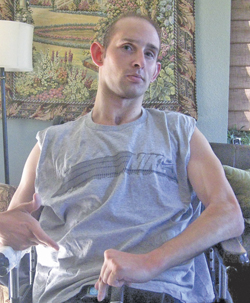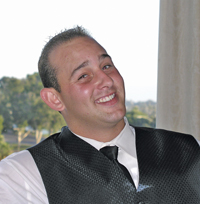
When Aaron Rubin graduated from Poway High School in 2000, he was a charismatic, outgoing athlete and a loyal, dedicated friend who was admired and respected by his peers. He planned to work with his dad, make lots of money and travel the world. Five years after graduation, Aaron’s plans came to an abrupt halt when he overdosed on OxyContin. The overdose caused Aaron to have a heart attack and two strokes, leaving him unable to walk, feed himself or speak. Now, at age 28, he is completely dependent on others for his care.
Aaron’s path to his overdose began in tenth grade, taking muscle relaxers while playing football. It progressed to drinking, and then to drugs. For a while, Aaron’s habits flew under his parents’ radar because he was still getting good grades and he was a charmer, able to manipulate his way through any conversation.
Aaron’s dad, Mike Rubin, says, “You want to believe your kid, and he was very believable.”
Eventually, Mike and Sherrie, Aaron’s mom, realized that something was very wrong. They had Aaron drug tested and sought help from doctors, therapists and psychiatrists. Aaron spent some time in rehab, but later relapsed. When Aaron started abusing OxyContin, his parents didn’t know anything about it. He overdosed within one year of his first hit.
“I had no clue about OxyContin [or] how addictive it is,” Sherrie says. “It’s dangerous. Oxy users become addicts. I would rather scream in pain than take an Oxy [even if it was prescribed].”
Sherrie and Mike’s philosophy used to be, “Trust your kids until they give you a reason not to.” Now, they are sending this message: “Parenting is not a trust issue. Your job as a parent is to protect your child. Love your kids. Drug test your kids. It gives them a reason to say no to drugs. It’s for their protection.”
Joe Olesky, a substance abuse counselor with the San Dieguito School District’s READI Program agrees. “Drug testing your kids is not a cure-all, but it’s a deterrent. It will make kids think twice about what they’re doing.”

Aaron’s parents say that if they knew then what they know now, they would have been much more aggressive about getting help.
“I thought substance abuse was a weakness, not a disease,” Sherrie says. “I think this is a common misconception among many people. Rehab is not the answer. It is merely the first step to recovery. Addiction is a lifelong disease that requires much more than help from a doctor.”
Now, Aaron and Sherrie participate in the DEA’s drug education program. Sherrie shares her experience and reads entries from Aaron’s rehab journal. Then she asks Aaron yes or no questions, giving him an opportunity to respond in the only way he can: by raising one finger for yes, and two for no.
>> Be sure to continue reading about San Diego's Prescription Drug Epidemic and What Parents Need to Know about Prescription Drugs
>> The San Diego Sheriff's Department participates in the National Prescription Drug Take-Back Day. Visit their website for the next event.
> Watch a video of Aaron Rubin, an OxyContin overdose survivor from our August article.
>>UPDATE: Watch an informative video from Parents360 Rx and find out what parents should look for and educate themselves on the real dangers of medicine abuse and ways to prevent and respond to it.
---------------------
Lisa Gipson is a freelance writer, part of the SDFM staff and mother of three daughters.
updated: September 28, 2012
